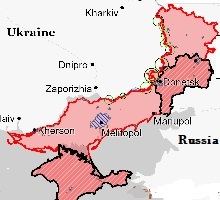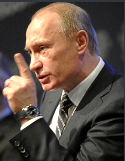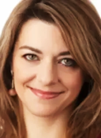 Vladimir Putin espoused irredentist and imperialist views challenging Ukraine's legitimacy as a state, declared that Russia wanted to "demilitarise and denazify" Ukraine and made irrational claims that the Ukrainian government was a group of neo-Nazis who were conducting genocide against the Russian minority in the Donbas. Transnistria in Moldova, Abkhazia and South Ossetia in Georgia, or the Donetsk and Luhansk People's Republics in Ukraine are examples of territories where the Kremlin has usually chosen to create "frozen" or "managed" war. Russia has tended to maintain a military presence through territorial occupation or support for separatist states, acting as a self-proclaimed “peacekeeper” to advance its interests in the regions and often imposing puppet leadership, rather than completely invading nations like Georgia, Moldova, Ukraine, Armenia, Kyrgyzstan, or Tajikistan. Vladimir Putin espoused irredentist and imperialist views challenging Ukraine's legitimacy as a state, declared that Russia wanted to "demilitarise and denazify" Ukraine and made irrational claims that the Ukrainian government was a group of neo-Nazis who were conducting genocide against the Russian minority in the Donbas. Transnistria in Moldova, Abkhazia and South Ossetia in Georgia, or the Donetsk and Luhansk People's Republics in Ukraine are examples of territories where the Kremlin has usually chosen to create "frozen" or "managed" war. Russia has tended to maintain a military presence through territorial occupation or support for separatist states, acting as a self-proclaimed “peacekeeper” to advance its interests in the regions and often imposing puppet leadership, rather than completely invading nations like Georgia, Moldova, Ukraine, Armenia, Kyrgyzstan, or Tajikistan. |
Russia's Ideological Construction in the Context of the War in Ukraine
See full text and footnotes here
by Marlène Laruelle
Since the full-scale invasion of Ukraine on February 24, 2022, the Russian government has been proactive in the ideological realm to ensure the sustainability of the war for Russian society. Counter to the claims of many Western observers, this paper argues that the Russian regime does have an ideology, in the sense of a relatively consistent and coherent political project for Russia and aspirations to build a new world order. This ideology is based on a set of beliefs that has evolved over the years while remaining true to its core principles. However, it draws on an eclectic doctrinal stock and multiple (sometimes contradictory) repertoires, and sees content as situational and therefore malleable.
With the war, proponents of the officialization of a state ideology—all from the hawkish part of the establishment—have been gaining weight: the Presidential Administration now mainly reproduces language and tropes that have long been present in the security and military realm and have become the official orthodoxy. Yet while new indoctrination methods and textbooks are introduced to the school system, the Kremlin has not so far recreated a Soviet-style ideological monolith: even in the context of war, it appears hesitant to engage in excessive “true teaching”, preferring a functional, technocratic understanding of ideology. 
After briefly defining what ideology means for the Putin regime, this paper explores how the main set of beliefs, strategic narratives, and doctrines have stabilized and gained increased internal coherence, as well as how new textbooks and military-patriotic indoctrination mechanisms are developed, before delving into the social reception of this official ideology.
Since the full-scale invasion of Ukraine on February 24, 2022, the Russian government has embarked on a flurry of new projects to ensure the promotion of the “special military operation” and the sustainability of the war for the Russian economy and society. In parallel, the Duma passed a record number of laws—more than 650—in 2022. The state has developed what has been called a Russian version of military Keynesianism, providing massive state support for military-industrial production —which has served to revive the economies of several depressed regions— and generous financial packages to men who go to the front and their families. The state also promises those who return from the war fast-tracked entry into public administration, health insurance, and free public transportation, as well as free university education and free food at school for their children.
In the ideological realm, too, the regime has been proactive. Yet, while there has been a visible radicalization of state language, this should not be read as a total rupture. Rather, Russia’s ideological construction has undergone a process of gradual sedimentation, with several turning points, of which the war is both the most recent and, of course, the most dramatic. Not only have grand narratives crystallized in a more acute form and gained internal coherence, but also—and more importantly—the scale on which the toolkit of indoctrination and repression has been deployed has changed: whereas these efforts once targeted specific segments of the population— underprivileged young people, in the case of indoctrination, and the liberal opposition and activists, in the case of repression—they now reach a broader swath of the public. Yet the regime still hopes to avoid carrying out mass repressions by manufacturing consent to the war. Indeed, the ruling elites are divided between those who wish to reduce pressure on society and those who call for greater censorship and repression; interestingly, Putin himself observed in December 2023 that the country should not repeat the Soviet-era repressions.
Western observers tend to dismiss Russia’s ideological construction, seeing it as defying logic and being comprised of a collection of random aberrations. This paper argues, on the contrary, that this construction has its own logic and plausibility, and is credible for a large part of the Russian population. The combined work of the state administration and a whole constellation of ideological entrepreneurs, both individual and institutional, has created what can be called a discursive habitat—that is, a strategic culture “that circumscribes how government officials understand the world, enabling some policy avenues while closing down others”.
What is ideology for the Putin regime?
There are all kinds of claims about Russia’s ideology. For one school of thought, ideology is a simple rhetorical tool guiding a cynical and opportunistic regime motivated by material and financial interests. For another, ideology is a deep-seated, almost immutable cognitive frame, and every action taken by the Russian leadership should be read through an imperialist, revanchist, revisionist lens. For a third school, there is no binary opposition between ideology as a cover for material interests and ideology as a set of deep beliefs: ideology is an open-ended dynamic that is context-sensitive and meaning-making for both the regime and the population.
The lack of a consensual definition of ideology contributes to the multiplicity of contradictory analyses of the Russian regime’s relationship to the ideational realm. Indeed, there are several possible definitions of ideology, from a broad set of worldviews and values to a well-crafted doctrine of truth. This paper shares Clifford Geertz’s vision of ideologies as symbolic systems that serve as a road map for a person in a complex social reality and result in creative adaptation by each individual.12 It therefore argues that Putin’s regime does have an ideology, in the sense of a relatively consistent and coherent global view of its political project for Russia and the world, and that the population largely shares the main principles of this ideology.
An evolutive, cocreationist, and flexible ideology
One can identify three key features of Russia’s ideological construction. First, it has evolved over the last three decades, and chronology therefore matters: the 2022 war was not predetermined but became the only possible path, as a series of choices and circumstances led to the gradual closure of other options and futures.
The current ideology has deep roots in Soviet ideology, as the majority of ideological actors in today’s Russia were socialized in late Soviet society under Brezhnev. At that time, ideology was omnipresent in many aspects of everyday life, even if largely discredited and seen mainly as an exercise in conformity in the public space. Perestroika and the first years of independent Russia saw a radical deconstruction of Soviet ideology and its replacement with a kaleidoscope of contradictory narratives. However, a rapid recentralization process began around 1994-1995, during which time the Kremlin continued the re-ordering of ideology.
Since Putin’s arrival in power, one can schematically dissociate three eras: early Putinism (Putin’s first and second terms, 2000-2008), which featured an ideology that one can broadly define as liberal-conservative, looking for stabilization as well as modernization and global integration; late Putinism (Putin’s third and fourth terms, 2012-2022), marked by a more reactionary conservatism and trends toward both aggression and isolationism; and wartime Putinism, since the full-scale invasion of Ukraine, which has witnessed the accentuation of the previous features.
Wartime Putinism is to some degree doctrinally rooted in the 2020 constitutional amendments, which enshrined a revised version of the 19th-century tsarist formula “Orthodoxy, Autocracy, Nationality”, as well as in the two texts published by Putin in 2020 and 2021 on interpretations of the Second World War and the alleged unity between Russians and Ukrainians.
[ Full text ]
Marlène Laruelle, Ph.D., is Research Professor of International Affairs and Political Science at the Elliott School of International Affairs,  The George Washington University. She is also Director of the Illiberalism Studies Program and the former director of the Institute for European, Russian, and Eurasian Studies (IERES). Dr. Laruelle received her Ph.D. in history from the National Institute of Oriental Languages and Cultures (INALCO) and her post-doctoral degree (habilitation) in political science from Sciences Po in Paris. She has published widely on Russia’s ideologies and nationalism, on Russia’s foreign policy and soft power strategies, as well as on the rise of illiberal thoughts and politics in Europe.
The George Washington University. She is also Director of the Illiberalism Studies Program and the former director of the Institute for European, Russian, and Eurasian Studies (IERES). Dr. Laruelle received her Ph.D. in history from the National Institute of Oriental Languages and Cultures (INALCO) and her post-doctoral degree (habilitation) in political science from Sciences Po in Paris. She has published widely on Russia’s ideologies and nationalism, on Russia’s foreign policy and soft power strategies, as well as on the rise of illiberal thoughts and politics in Europe.
Comments powered by CComment